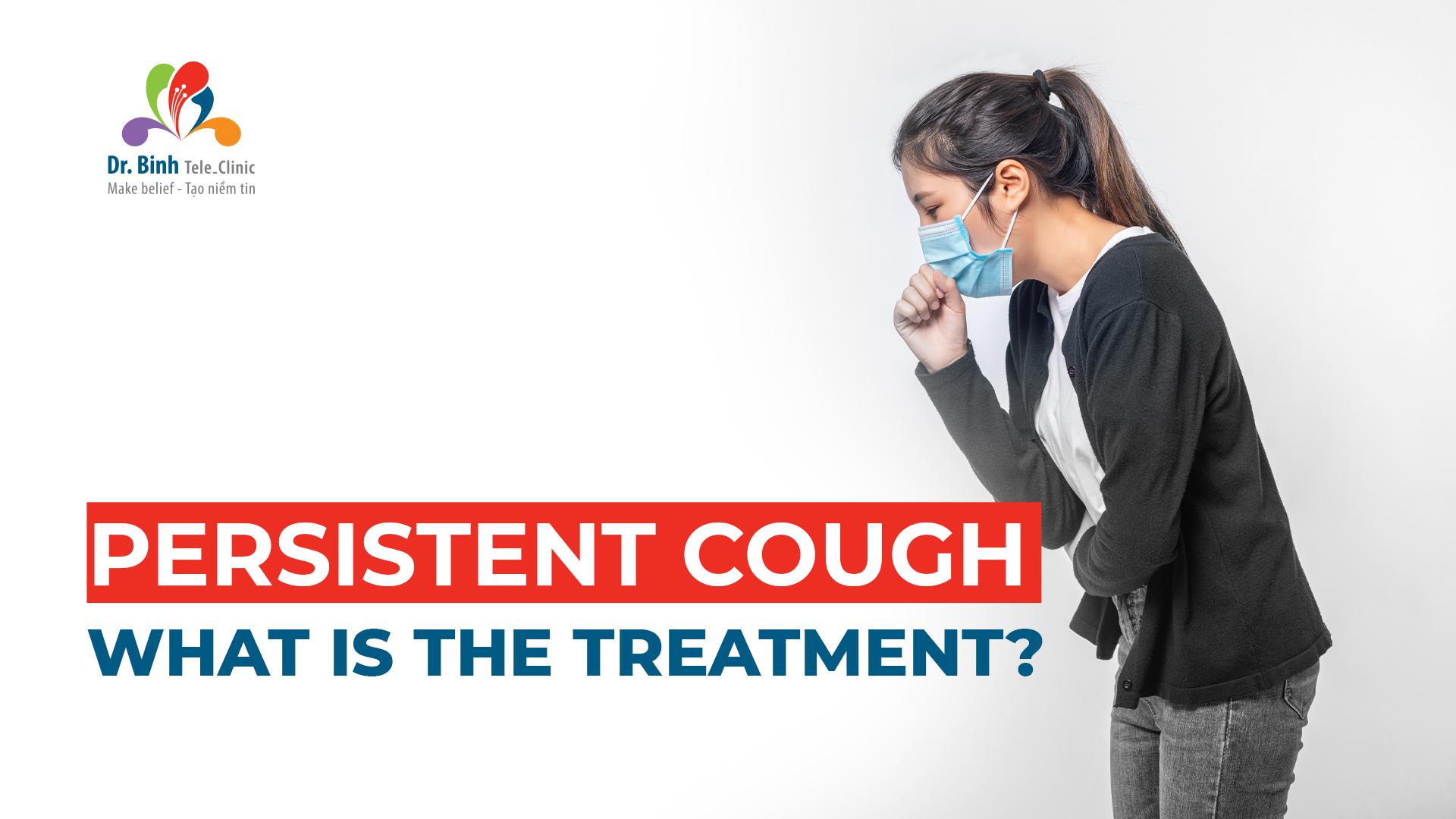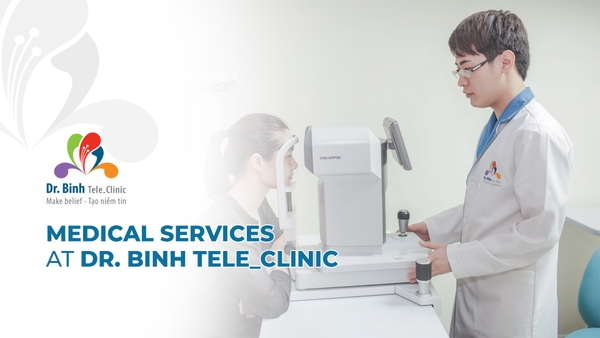PERSISTENT COUGH PHOBIA - WHAT IS THE TREATMENT?
- Dr.Binh Tele_Clinic offers up to 30% off on endoscopy with anesthesia combos
- Special Offers at Dr.Binh Tele_Clinic on Vietnamese Women’s Day
- Dangerous complications of cerebral infarction
- What to know when treating urinary stones?
14/07/2022
-0 Bình luận
Cough reflex occurs when the throat is entangled with foreign objects or when fluids irritate the respiratory tract lining. And this disease will become an obsession when the cough lasts for a long time; the patient needs to be careful because behind the cough are dangerous consequences for health. Today Dr. Binh Tele_Clinic will help you learn about cough and its treatment.

1. What causes a persistent cough?
Usually, the cough will clear up in 7-10 days if the patient is treated correctly. However, if, after performing treatments, the persistent cough persists and persists for more than 3 weeks, the patient should be aware of respiratory problems.

Prolonged coughing can be due to the following reasons:
- Patients who regularly use pipe tobacco: This is the most common cause of persistent cough in both smokers and non-smokers. Both active and passive smoking cause coughing and lung damage;
- Reflux of gastric juice into the esophagus: If your cough is prolonged, continuous and does not improve when taking the drug, you may have gastric reflux;
- Sinusitis: When the patient has sinusitis, in some cases, the mucus is too much, flowing down the throat wall, causing irritation and creating a cough reflex to push the phlegm out;

- Asthma: Bronchial asthma often appears seasonally, especially during the change of seasons; the respiratory tract is more sensitive and easily infected by external agents such as pollution, fine dust or cold air;
- Respiratory tract infections: Cough is one of the common symptoms of diseases such as flu, pneumonia and bronchitis ... In case of severe cough over time, taking medicine does not go away, and the patient needs to use the muscles. health facilities for accurate examination and diagnosis;
- Due to the side effects of some drugs: antihypertensive drugs, especially angiotensin-converting enzyme inhibitors... The composition of the drug has medicinal properties that cause prolonged dry cough; the cough will go away when the patient stops using it medicine;
- Other causes include bronchiectasis, chronic obstructive pulmonary disease (COPD), pneumonia, cystic fibrosis, lung cancer, and sarcoid disease.
Unlike a common cough, besides the symptoms of a common cough, a prolonged cough will be accompanied by the following symptoms:
- A prolonged cough will cause the patient to have a dry cough or a persistent cough with sputum, accompanied by a runny nose, stuffy/congested nose, clearly feeling nasal discharge down the throat wall;
- Prolonged cough causes the patient to collect or stick sputum in the throat wall, making the patient always feel like they want to clear their throat or have a sore throat;
- Shortness of breath, heavy breathing or hoarseness are the most apparent symptoms of this disease;
- Some cases when coughing will be accompanied by heartburn or a sour taste in the mouth or may cough up blood.
2. What to pay attention to when having a prolonged cough?
It will be worrisome if the cough lasts for more than 3 weeks because the cough not only interferes with daily work but the prolonged cough also damages the respiratory tract.

Not only that, but the prolonged cough is also a warning symptom of some dangerous diseases:
- Lung cancer: Up to 65% of lung cancer patients have signs of chronic cough at baseline. Be alert if you frequently cough for a long time with pink/red mucus, hoarseness and chest pain after coughing;
- Whooping cough: Symptoms of this disease are easily confused with the flu. However, it will be heavy over time and will not last long;
- Pneumonia: If you cough a lot at night and cough for a long time with green sputum or a cold, you most likely have pneumonia. Immediately go to a medical facility for an accurate examination and diagnosis of this disease;
- Tuberculosis: Derived from the common cough symptoms, worsening over time with chest tightness, shortness of breath, coughing up blood, and weakness, be careful with pulmonary tuberculosis. If not treated in time, TB bacteria will multiply complications and metastasize to other parts of the body;
- Chronic Obstructive Pulmonary Disease (COPD): Unlike pneumonia, if you have a persistent cough, shortness of breath, chest tightness and cough a lot in the morning, you may have chronic obstructive pulmonary disease. This is the result of smoking too much.
Refer to the lung cancer screening package at Dr. Binh Tele_Clinic HERE
3. How to effectively treat persistent cough?
When you have a long-term cough that does not go away even though you have used medicine and treated it in the usual way, you need to go to a medical facility for methods and early detection of the medical condition in time to avoid leaving later consequences.

To stop a persistent cough, we need to know the cause of the cough and here are some methods to support the treatment of persistent cough:
- Use of decongestants and antihistamines; medicines that have the effect of reducing inflammation, dilating the trachea and bronchi; cough suppressants, expectorants, antibiotics…;
- Use physiological saline to wash the nose, gargle to clean mucus and dirt in the nose and mouth;
- Maintain a stable body temperature, avoid sudden temperature changes such as going in and out of an air-conditioned room, wearing a mask to prevent dust, do not use foods that are too spicy, too hot or stimulants...;
- Change living habits to reduce gastric reflux, eat easily digestible foods, eat enough meals, limit fast food, carbonated water...;
- Daily exercise from 30 minutes to 1 hour;
- Fully vaccinated with vaccines as recommended by the Ministry of Health and as directed by the doctor.
Above is information about a persistent cough. Please get in touch with your doctor for advice and an accurate diagnosis of the disease, from which there will be a reasonable treatment method.
CS1: DR. BINH TELE_CLINIC
No. 11-13-15 Tran Xuan Soan, Pham Dinh Ho Ward, Hai Ba Trung District, Hanoi
Hotline: 19009204
Email: info@drbinh.com – Website: www.drbinh.com
Facebook: fb.com/biquyetchamsocsuckhoe
CS2: 365 MEDIHOME THANH LONG CLINIC
1st floor, Executive Building, Thang Long Industrial Park, Dong Anh, Hanoi
Hotline: 19009204
Website: thanglong.365medihome.com.vn/
Facebook: fb.com/365medihome




















Bình luận của bạn